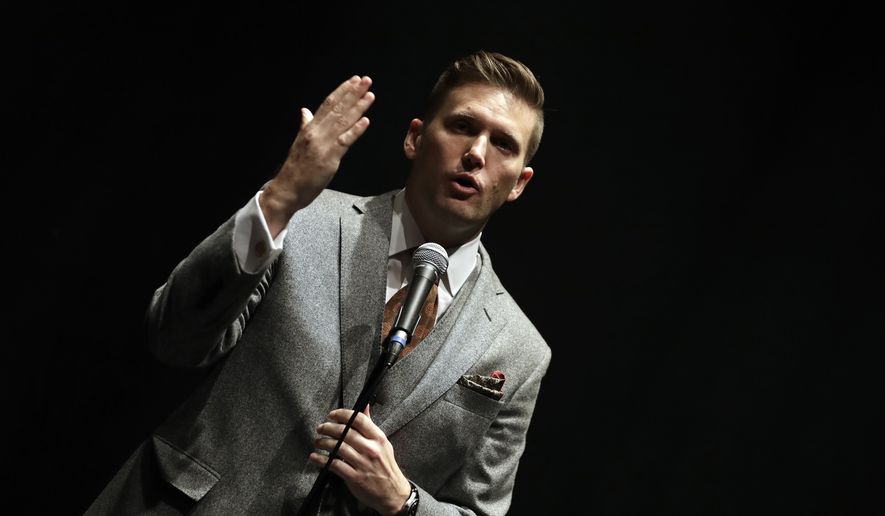Poland pushed back Friday against white nationalist Richard Spencer’s planned appearance at a far-right conference being held in Warsaw next month on the eve of Polish Independence Day.
“In connection with the information regarding the planned participation of Richard B. Spencer in a seminar organized by the National Social Congress on the occasion of this year’s independence Day celebrations, the Ministry of Foreign Affairs expresses its strong opposition to visits to Poland by individuals who propagate views that are based on racist, anti-Semitic and xenophobic ideas,” the Ministry said in a statement Friday.
“As a country which was one of the biggest victims of Nazism, we believe that the ideas promoted by Mr Spencer and his followers could pose a threat to all those who hold dear the values of human rights and democracy. We also believe that the views voiced by Mr Spencer are in conflict with the legal order of the Republic of Poland,” the statement said.
Mr. Spencer, the president of the racist National Policy Institute think tank, called the Polish government’s reaction “laughable.”
“I was invited to speak by Polish patriots,” Mr. Spencer told The Washington Times. “This characterization of me as connected to Nazism and threatening the Polish people couldn’t be further from the truth,” Mr. Spencer said Friday afternoon.
The far-right National Social Congress announced this month that Mr. Spencer, 39, would appear on a panel discussion on Nov. 10 during its “Europe of Future” debate, prompting the American Jewish Committee (AJC) to urge Polish authorities this week to stop him from attending.
“The hatred that Spencer and his followers proclaim is a threat to all who are close to the values of human rights and democracy,” Agnieszka Markiewicz, director of the AJC Central European office, said Monday. “We call on the organizers to remove his name from the list of participants in the planned meeting, and the authorities to support this call.”
Foreign Minister Witold Waszczykowski responded Friday, labeling Mr. Spencer as someone “who defames what happened during World War II, defames the Holocaust.”
“He should not appear publicly, and especially not in Poland,” Mr. Waszczykowski said, The Associated Press reported.
Celebrated annually on Nov. 11, Polish Independence Day commemorates the anniversary of Poland’s liberation in 1918, 31 years before the country was invaded by Nazi Germany and Soviet Union forces at the start of World War II.
Mr. Spencer is widely credited with coining the term alt-right, a label given to a budding political movement associated with embracing far-right ideologies including nationalism and anti-Semitism. He’s led the National Policy Institute since 2011, but gained notoriety in November when attendees at the group’s annual convention infamously responded to his address with Nazi-style salutes.
Mr. Spencer had been slated to headline “Unite the Right,” a far-right rally scheduled for Aug. 12 in Charlottesville, Virginia, but his appearance was canceled when clashes broke out on the morning of the event between protesters and participants, including neo-Nazis and white nationalists. Three people ultimately died in connection with the event, including two state troopers and a woman protesting white supremacists.
Mr. Spencer participated in planning a conference in Budapest in October 2014, “The Future of Europe — Perspectives on Geopolitics, Identity and Nationalism,” but the event was canceled by the interior minister. Mr. Spencer tried to hold the event anyway and was subsequently arrested, deported and banned from Europe’s 26 visa-free countries for three years — a period that would’ve expired earlier this month.
A spokeswoman for the Polish Border Guard declined to state if Mr. Spencer would be denied entry ahead of next month’s conference, citing privacy rules, AP reported.
• Andrew Blake can be reached at ablake@washingtontimes.com.




Please read our comment policy before commenting.